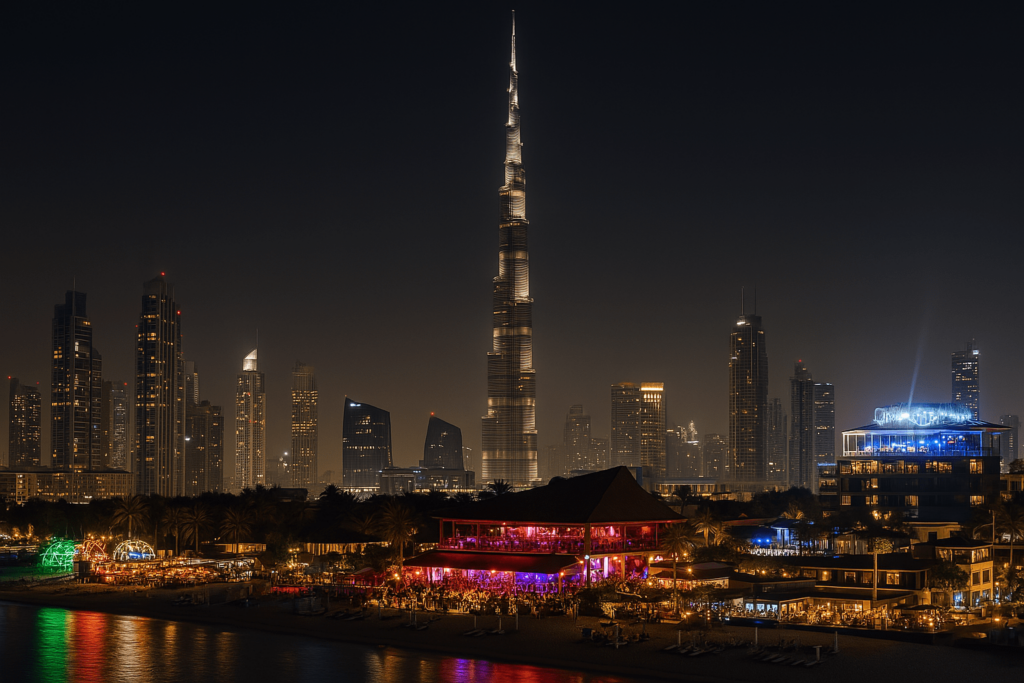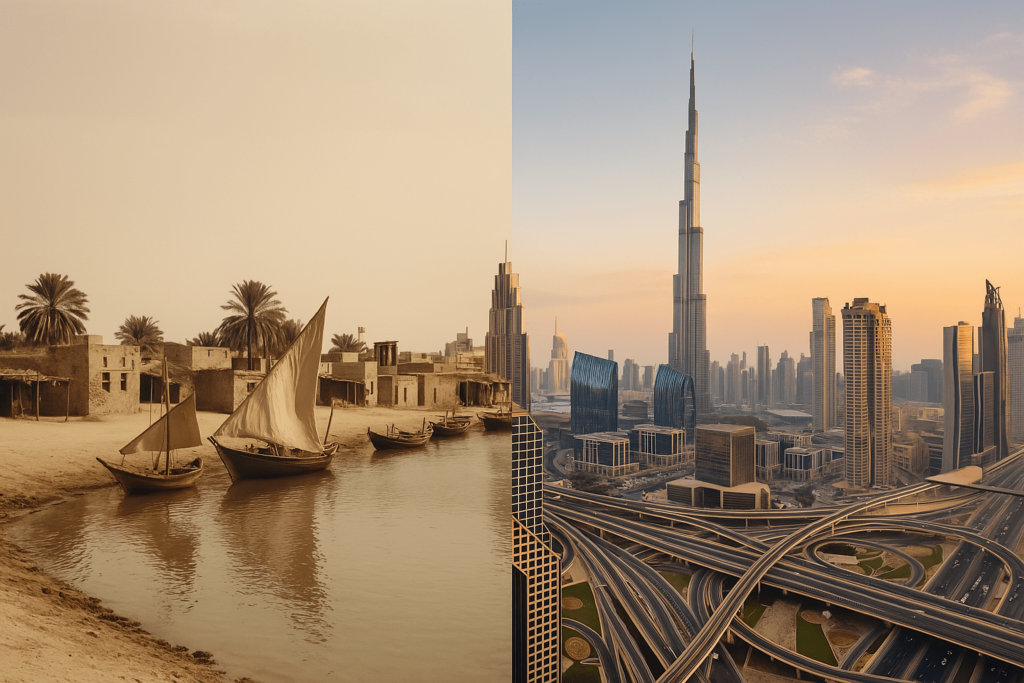Nightlife in Dubai – What’s Legal, What’s Not

Dubai is known for its glitzy skyline, luxury experiences, and vibrant nightlife. But unlike party destinations like Ibiza or Bangkok, Dubai follows a unique set of laws and cultural norms rooted in its Islamic heritage. If you’re wondering what’s allowed and what’s not in Dubai’s nightlife, this 2025 guide breaks it down clearly so you can enjoy your evenings without crossing any legal lines. Is Nightlife Legal in Dubai? Yes, nightlife is legal in Dubai — including bars, clubs, beach parties, and concerts. However, it’s strictly regulated. Most venues operate inside licensed hotels and follow rules regarding alcohol service, dress code, and behavior. Visitors can enjoy world-class DJ sets, rooftop lounges, and even late-night beach clubs — all within the boundaries of the law. Legal Nightlife Activities in Dubai (✅) Illegal or Restricted Nightlife Activities in Dubai (❌) Top Nightlife Spots in Dubai (2025) Here are some of the best legal places to experience Dubai’s nightlife: Alcohol Laws to Know As of 2023, tourists are no longer required to obtain an alcohol license for personal consumption in Dubai. However: Dress Code Tips for Dubai Nightlife Dubai is fashion-forward, but modesty is still expected in some settings. Here’s what works: Can You Party During Ramadan? Yes, but with restrictions. During Ramadan, nightlife continues behind closed doors. Many venues operate quietly without loud music or alcohol until after sundown. Always be respectful of local customs during this time. Safety & Etiquette Tips Conclusion Dubai offers a lively, luxurious, and unique nightlife experience — but it’s essential to follow the rules. Stick to licensed venues, drink responsibly, and show respect for the local culture. By understanding what’s legal and what’s not in Dubai nightlife, you can enjoy unforgettable nights in one of the safest and most glamorous cities in the world. FAQ
Understanding Emirati Culture – 10 Things to Know Before Visiting Dubai

Dubai is a modern, multicultural city, but at its heart lies a rich Emirati culture rooted in tradition, religion, and hospitality. Whether you’re a tourist or a new expat, gaining insight into local customs will enhance your experience and help you show respect. Here are 10 key things to know about Emirati culture when visiting or living in Dubai. 1. Islam is Central to Daily Life The UAE is a Muslim country, and Islamic values shape many aspects of life. Expect to hear the call to prayer (adhan) five times a day, and observe shorter working hours during Ramadan. While Dubai is tolerant, respecting Islamic practices — such as avoiding public eating during fasting hours in Ramadan — is essential. 2. Modesty in Dress is Respected Dubai is more relaxed than other Gulf cities, but dressing modestly is still appreciated. Women should avoid overly revealing clothing in public places like malls or government buildings. Men should also avoid going shirtless outside the beach or pool. Shoulders and knees covered is a good rule of thumb. 3. Emirati Hospitality is Generous Hospitality is a cornerstone of Emirati culture. If you’re invited to an Emirati home, expect dates and Arabic coffee to be served. It’s polite to accept with your right hand and express gratitude. Guests are treated with deep respect — it’s considered an honor to host someone. 4. The Arabic Language While English is widely spoken in Dubai, Arabic is the official language. Learning a few basic words like “Shukran” (Thank you) and “Salam Alaikum” (Peace be upon you) shows cultural respect. Many signs, government documents, and public announcements are in both Arabic and English. 5. Family is the Foundation Family plays a central role in Emirati life. Households often include extended family members, and strong bonds are maintained through weekly gatherings and shared meals. Emirati society places high importance on loyalty, respect for elders, and community values. 6. Public Behavior Etiquette Dubai is cosmopolitan but has cultural boundaries. Public displays of affection (PDA), such as kissing or hugging, should be avoided. Swearing, loud arguments, and gestures deemed offensive can lead to fines or legal action. Respect for others’ space and dignity is part of daily etiquette. 7. The Role of Women Emirati women are highly respected and have a growing presence in education, business, and government. They often wear the traditional abaya and shayla, though this is a choice. Visitors should be mindful and courteous when interacting with women — avoid physical contact unless initiated and always ask permission for photos. 8. Religion and Non-Muslims Dubai is open to all faiths. You’ll find churches, temples, and gurdwaras operating freely. However, proselytizing or disrespecting Islam in any way is a serious offense. Visitors of all beliefs are welcome — as long as they show respect for the UAE’s religious foundation. 9. Traditional Clothing and Identity Many Emiratis wear traditional dress with pride. Men wear the white kandura and headscarf (ghutra or shemagh), while women wear the abaya. These garments are not just for tradition, but also for comfort in the hot climate. It’s respectful not to imitate these outfits for fun or fashion. 10. Coffee and Dates – Symbols of Welcome Arabic coffee (gahwa) and dates are not just snacks — they’re symbols of hospitality. Served at homes, offices, and events, they represent a warm welcome. Accept with your right hand and slightly shake the coffee cup when finished — a small but meaningful cultural gesture. Conclusion Understanding and appreciating Emirati culture helps you connect more deeply with the people of Dubai and the UAE. It’s a culture of pride, hospitality, and respect — values that shine even in the city’s fast-paced, global environment. Embrace the traditions, and your experience in Dubai will be all the more rewarding. FAQ
History of Dubai – From Desert Settlement to Global City

Dubai, one of the world’s most modern and glamorous cities, has a rich and fascinating history rooted in trade, tradition, and transformation. Once a quiet fishing village on the Arabian Gulf, it has evolved into a global hub for business, tourism, and innovation. Let’s explore the history of Dubai and how it became the futuristic metropolis we know today. 1. Early Beginnings – Life Before the Skyscrapers Long before oil and luxury towers, Dubai was a small coastal settlement inhabited by the Bani Yas tribe. Archaeological finds suggest human activity in the region dating back to the Bronze Age (around 3000 BCE). The city’s natural creek made it a prime location for fishing, pearl diving, and trade with nearby regions like Persia, India, and East Africa. 2. The Rise of a Trade Hub (18th – 19th Century) Dubai was officially established as a town in the early 18th century. By 1833, the Al Maktoum family, still the ruling dynasty today, took control. Thanks to its strategic location, Dubai became a growing port city, welcoming traders and merchants. The city offered low taxes and a business-friendly environment, attracting settlers from Iran and India, laying the foundation for a multicultural society. 3. The Pearl Industry Boom (19th – Early 20th Century) From the late 1800s to the early 1900s, pearl diving was the lifeline of Dubai’s economy. Hundreds of dhows would sail each season in search of pearls, providing employment and wealth for many. However, the industry collapsed in the 1930s due to the rise of cultured pearls in Japan and the global economic downturn. 4. Discovery of Oil and Transformation (1960s – 1980s) Everything changed with the discovery of oil in 1966. Under the leadership of Sheikh Rashid bin Saeed Al Maktoum, the city used oil revenues to build infrastructure — roads, ports, schools, hospitals, and airports. In 1971, Dubai joined with other emirates to form the United Arab Emirates (UAE). Unlike other oil-rich nations, Dubai began investing heavily in diversification early on, focusing on trade, tourism, aviation, and finance. 5. The Vision of Sheikh Mohammed (1990s – 2000s) Under Sheikh Mohammed bin Rashid Al Maktoum, who became ruler in 2006, Dubai launched ambitious projects to redefine the city on a global scale. Iconic developments like: transformed Dubai into a symbol of ambition, innovation, and luxury. 6. Expo 2020 and the Future of Dubai In 2021, Dubai hosted Expo 2020 (postponed due to COVID-19), attracting millions of visitors and showcasing the city’s commitment to technology, sustainability, and global collaboration. The event cemented Dubai’s status as a forward-thinking city with global influence. Today, Dubai continues to diversify with initiatives like Dubai 2040 Urban Master Plan, focusing on green spaces, innovation, and sustainable living. It’s also positioning itself as a leader in AI, blockchain, space exploration, and digital finance. Conclusion From a small pearl-diving village to a futuristic skyline that touches the clouds, the history of Dubai is a story of vision, resilience, and transformation. Rooted in tradition but focused on the future, Dubai is not just a city — it’s a symbol of what ambition can build. FAQ

